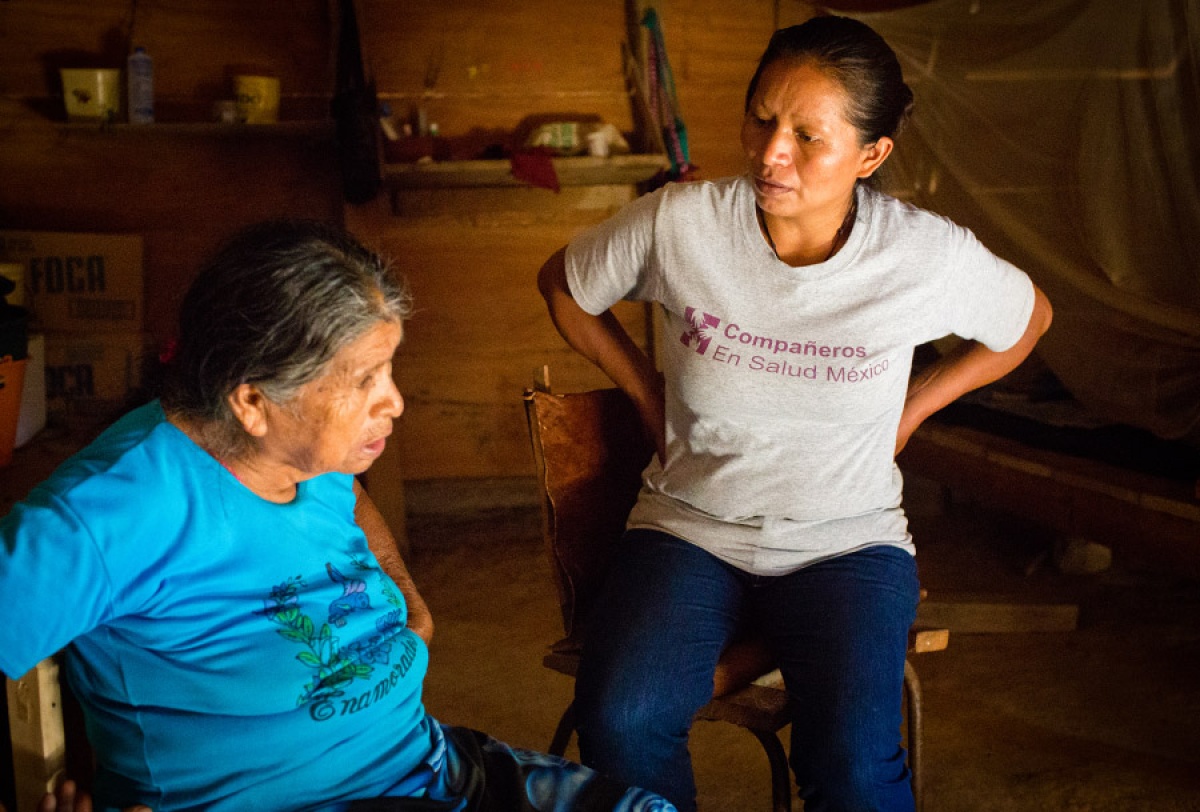Trilingual Community Health Worker Bridges Gap to Care in Mexico
Posted on Sep 29, 2015

Maribel Perez is a busy woman. The 38-year-old mother of six gets up before sunrise to cook breakfast, make tortillas, get her children ready for school, and walk them there every weekday. All this happens before she starts her other job as an acompaňante, or community health worker (CHW), with Compaňeros En Salud, Partners In Health’s sister organization in Chiapas, Mexico.
Perez is one of 50 CHWs who visit patients throughout rural Chiapas, but she’s the only one who is trilingual. In addition to Spanish, she speaks the indigenous Mayan languages of Tzeltal and Mam. Her skills come in handy on home visits and when translating for the Spanish-speaking first-year doctor, or pasante, working in Plan de la Libertad’s two clinics. Her patients no longer hesitate to visit their nearest clinic now that they can “speak,” via Perez, with the doctor.
Originally from Guatemala, Perez traveled to Mexico with her father when she was 13 to work in the coffee fields. Her life has been a whirlwind ever since. In 25 years, she’s had a string of odd jobs that took her from Chiapas to California, to Guatemala and back again. Before becoming a CHW one year ago, she used to sell tamales, bread, and chicken in addition to completing her duties as a housewife and mother.
Perez now cares for seven patients, two of whom speak only Tzeltal, and visits them up to two times each week. We spoke with her before dawn one morning, as she cooked tortillas over a wood fire and chicks chirped from a corner of the outdoor kitchen.
Did your Tzeltal-speaking patients come to the clinic before you started as a CHW?
Once I was talking with a patient and I asked her how she got her medication before I started visiting her. She said she wanted to go to the clinic, but she wouldn’t be able to understand the doctor, and he wouldn’t be able to understand her. And her husband works, so he couldn’t go with her. So she just didn’t go.
That’s where I feel like I’m helping a lot, or at least I have helped her. She hasn’t missed a treatment or gone without pills. She’s been really well.
What are the major health concerns in Plan de la Libertad?
The most common illnesses are stomach pains, fever, coughs, and flus—especially for children during the rainy season. There’s a lot of chronic disease. For example, here in the community there’s diabetes, asthma, hypertension, and depression. Then there are other illnesses I didn’t know about before I became a CHW, such as schizophrenia and epilepsy.
 |
|
Perez (right) returns home with her daughter after visiting one of her seven patients, whom she typically sees up to two times each week. |
Do people practice traditional medicine here?
Yes, that’s what they tell me. But the truth is that I don’t know if it has any effect. For high blood pressure, for example, they drink tea made from the boiled leaves of a lime tree. There’s no proof that it works. For the flu, some people drink tea made from bougainvillea leaves and chamomile, boiled together with cinnamon. That’s what we prepare sometimes too. Tea with honey is good when you feel really congested.
Are there any traditional medicines that you discourage?
Sometimes people come from outside the community offering natural remedies saying, “This is really good. This will cure you!” A little while ago, a woman who said she was a naturalist was offering some remedy for diabetes and hypertension, and many said that it was good, that the results were worth it, so they stopped taking their medication. But a little while later, no one was cured. Now they are on the clinic’s medication again.
Has your job helped you in any way?
It makes me happy, because through this job I’ve met people I never thought I’d meet. And it’s helped me a lot because I feel fulfilled. Before I went from my kitchen, to my house, to the school and nowhere else. But with this job, I go to visit my patients. I get some exercise. I get out of my home. I forget about my own housework for a little while. When I’m out for a walk, I meet people along the road and I laugh with them.
What do you enjoy most about being a CHW?
I enjoy helping people who don’t speak Spanish.
Have you applied any lessons to your own health?
Several times we’ve had the chance to take psychoeducation courses with CES doctors. I’d experienced many things since the time I was a child up until just a little while ago. All of the advice and training Compaňeros En Salud doctors gave me, it’s helped me a lot.
Do you think the CHW program benefits communities?
This program should expand to other communities, because there are places where people don’t have family or anyone, but they need medication. Because they don’t have a CHW or aren’t aware of their health, they don’t get treatment. That’s what I would say, that there should be more of this, that the program should continue growing.

